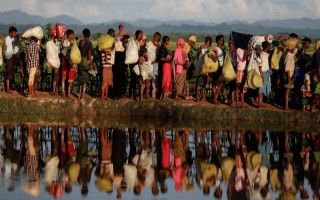UN seeks $920 million to tackle Rohingya crisis
The United Nations aid agencies and NGO partners on Friday said that this year they would need $920 million to tackle Rohingya refugee crisis in Bangladesh where more than 900,000 Rohingya refugees fled to escape violence in Myanmar.
More than half of the fund would be needed to provide critical aid and services such as food, water, sanitation and shelter, said a press release jointly issued by United Nations High Commission for refugees and International Organisation for Migration.
A portion of the fund was earmarked for health, site management, and protection activities including child protection and addressing sexual and gender-based violence, education and nutrition, said the press release.
The fund will also take care of the needs of 330,000 host families in Bangladesh, it said.
The UN aid agencies and NGO partners have so far launched three joint response plans to tackle the Rohingya refugee crisis following the largest of the refuges influxes to Bangladesh since August 2017.
More than 750,000 Rohingya refugees entered Bangladesh after 2017 to join more than 200,000 refugees who had fled the country over the years facing state-sponsored persecution back in home in Myanmar.
‘Our humanitarian imperative today is to stabilise the situation of stateless Rohingya refugees and their Bangladesh hosts,’ said UN high commissioner for refugees Filippo Grandi in the press release.
‘We are hoping for timely, predictable and flexible contributions in order to meet the goals of this year’s appeal,’ he added.
Grandi reiterated the call to Myanmar to ‘address the root causes of this crisis which have persisted for decades, so that people are no longer forced to flee and can eventually return home in safety and dignity.’
He also called on the countries in the region to stand by Bangladesh to end the crisis.
The new Joint Response Plan, or JRP, seeks to achieve three strategic goals: Delivering protection to refugee women, men, girls and boys, providing life-saving assistance and fostering social cohesion.
Under the 2018 JRP, the press release said, basic assistance was provided to the refugees, their living conditions were upgraded and disaster risk mitigation activities were taken for monsoon and cyclone seasons.
Last year the refugees were given basic emergency shelter to protect them against rains during monsoon but safer and most robust shelter were now required, said the press release.
Though around 860,000 refugees regularly receive food assistance only 240,000 of them are able to diversify their diet beyond the minimum package of rice, lentils and oil, it said.
These resources must be expanded to ensure their nutrition and health and continued investments into safe water and sanitation, health and protection services are vital, it added.
The environmental impact of the influx has been reduced through introduction of Liquefied Petroleum Gas, or LPG, as an alternative cooking fuel to firewood in 2018, said the press release.
In 2018, the UN aid agencies and NGO partners received $655 million, 69 per cent of $950 million requested, said the press release.
IOM director general António Vitorino said in the press release that the 2018 JRP was successfully implemented thanks to cooperation from Bangladesh government and the partners.
The press release mentioned that the prevalence of global acute malnutrition dropped to 12 per cent currently from 19 per cent during late 2017, food security improved, immunisation coverage reached 89 per cent and women delivering babies in health facilities rose to 40 per cent from 22 per cent.
The situation of Rohingya refugees, however, remains extremely precarious, the press release said.
It stressed on the necessity to provide support to Bangladesh and said that the Rohingya refugees needed to continue living here as long as the refugees were not ensured return home with dignity.
Last October, Marzuki Darusman, the chair of the UN fact-finding mission on Myanmar, said that an genocide was ongoing in Myanmar as Rohingyas still living there continued to suffer repression.
UN special rapporteur on human rights Yanghee Lee said last month that the Myanmar army chief should be prosecuted for genocide.
News Courtesy: www.newagebd.net











